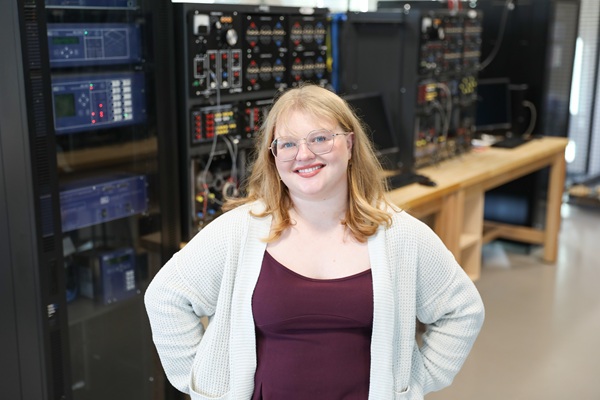Keeping the lights on: Montana Tech student pursues power and purpose in electrical engineering

When you ask Hannah Gingery why she wants to be an electrical engineer, she has a straightforward answer.
“I don’t really care about putting Katy Perry on a rocket to go to space,” she said. “I care about people having heat in their homes.”
Gingery, a junior in electrical engineering at Montana Technological University, hails from Havre, where winter temperatures can plunge to -40 or lower, and heating is more than a convenience – it’s a lifeline. Gingery comes from a family that’s been keeping the power on for generations. Her dad, grandfather, and uncles are all linemen. She grew up hearing about how electrical engineers play a critical role in keeping the power grid running, without having to go out in the extreme cold and withstand the elements like lineman do.
“The more I heard about it, the more I thought, ‘That sounds kind of nice,’” Gingery said.
In high school, her dad built a windmill to power their chicken coop — a project that sparked her curiosity in renewable energy and power systems. When it came time to pick a college, Gingery chose Montana Tech because it was most affordable.
As a student she’s taken advantage of Montana Tech’s state-of-the art labs that provide hands-on training. It’s been valuable as she progressed into a role as an intern.
Gingery’s first internship came after she walked into Heberly & Associates, an engineering firm in Havre, résumé in hand, and asked if they needed summer help.
“They called me two hours later and offered me the job,” she said.
She spent the summer working as a paid inspector on a fiber optic cable installation in Buxton.
“I was constantly asking questions,” Gingery said. “’How does this work? Can I drive this? Can I run that?’ I just wanted to learn everything, and I did learn so much.”
Now, she works part-time for NorthWestern Energy in its gas transmission department, and is collaborating with the company on a senior design project. Her project involves assisting on design of a mobile city gate that can be distributed during construction or an emergency to keep natural gas flowing from a high-pressure transmission line to low-pressure local distribution system.
Gingery’s also joined a number of organizations that help her network and grow as an engineer. She’s a Prospector, the title given to Montana Tech’s student ambassador. In that role she gives campus tours to visiting students and families. She’s also a member of IEEE, the professional association for electrical engineers. Gingery is also the vice president of Montana Tech’s chapter of the Society of Women Engineers (SWE). From conferences to fundraisers, SWE helps other women engineers connect and grow.
This October, Gingery and nine other SWE members will travel to New Orleans for the annual Women in Engineering Conference.
“It’s such a great experience,” she said. “There are technical talks, career fairs, and networking opportunities. One of our past presidents actually got her job there.”
Last year’s conference in Chicago left a lasting impression.
“It made me proud to be in engineering,” Gingery said. “My favorite talk was on microgrids — how one solar-powered house can operate independently instead of relying on a huge field of panels. After natural disasters, they could power just a hospital, for example. That’s the kind of work that makes a difference.”
While electrical engineers can work anywhere in the world, Gingery plans to stay in Montana after she graduates.
“I’m a Montana girl,” Gingery said. “I like knowing the people I work with, seeing how what I do helps my community. That’s what engineering is about — building things that make life better for everyone.”
To learn more about Montana Tech’s B.S. Electrical Engineering program, click here.